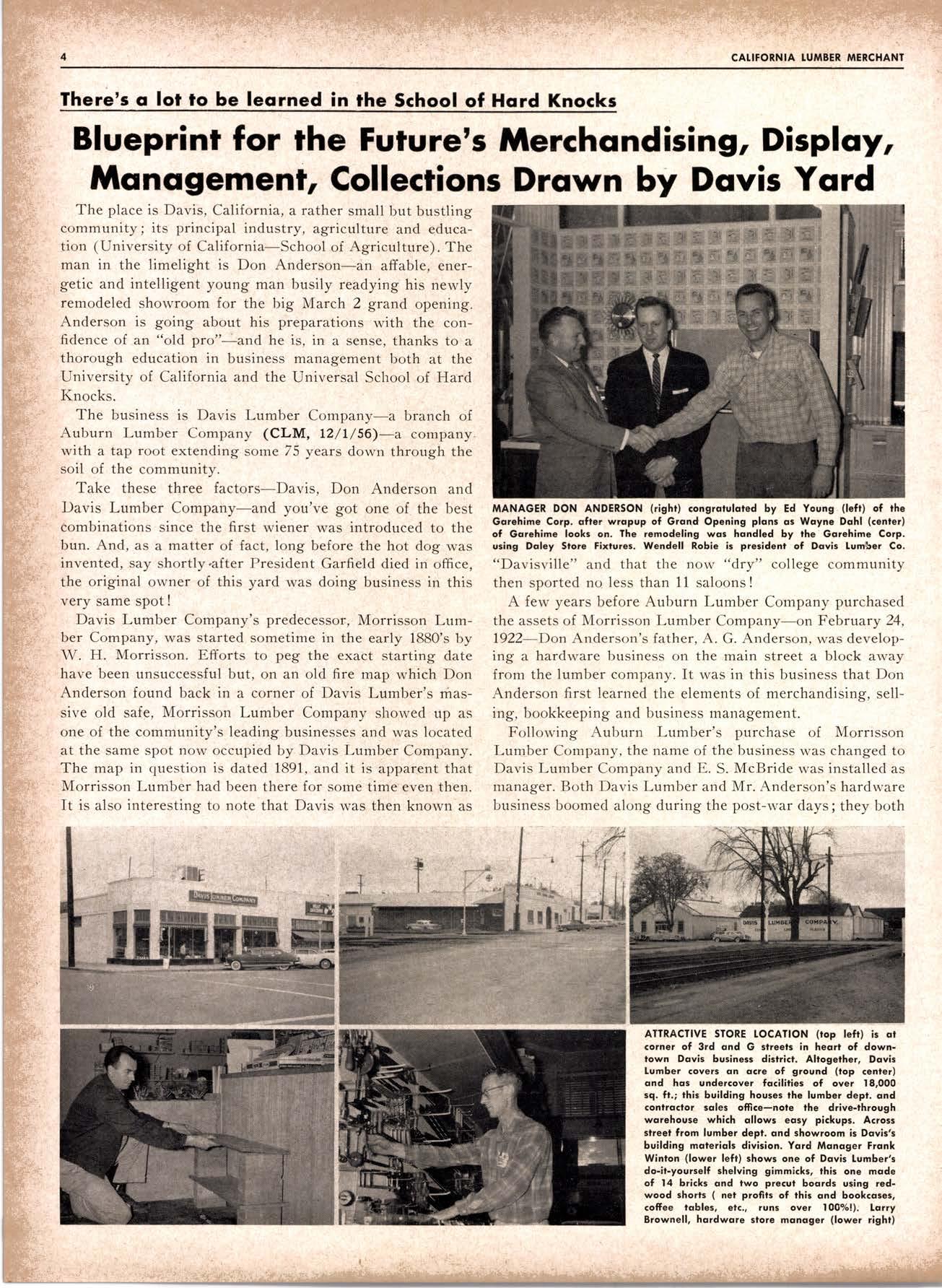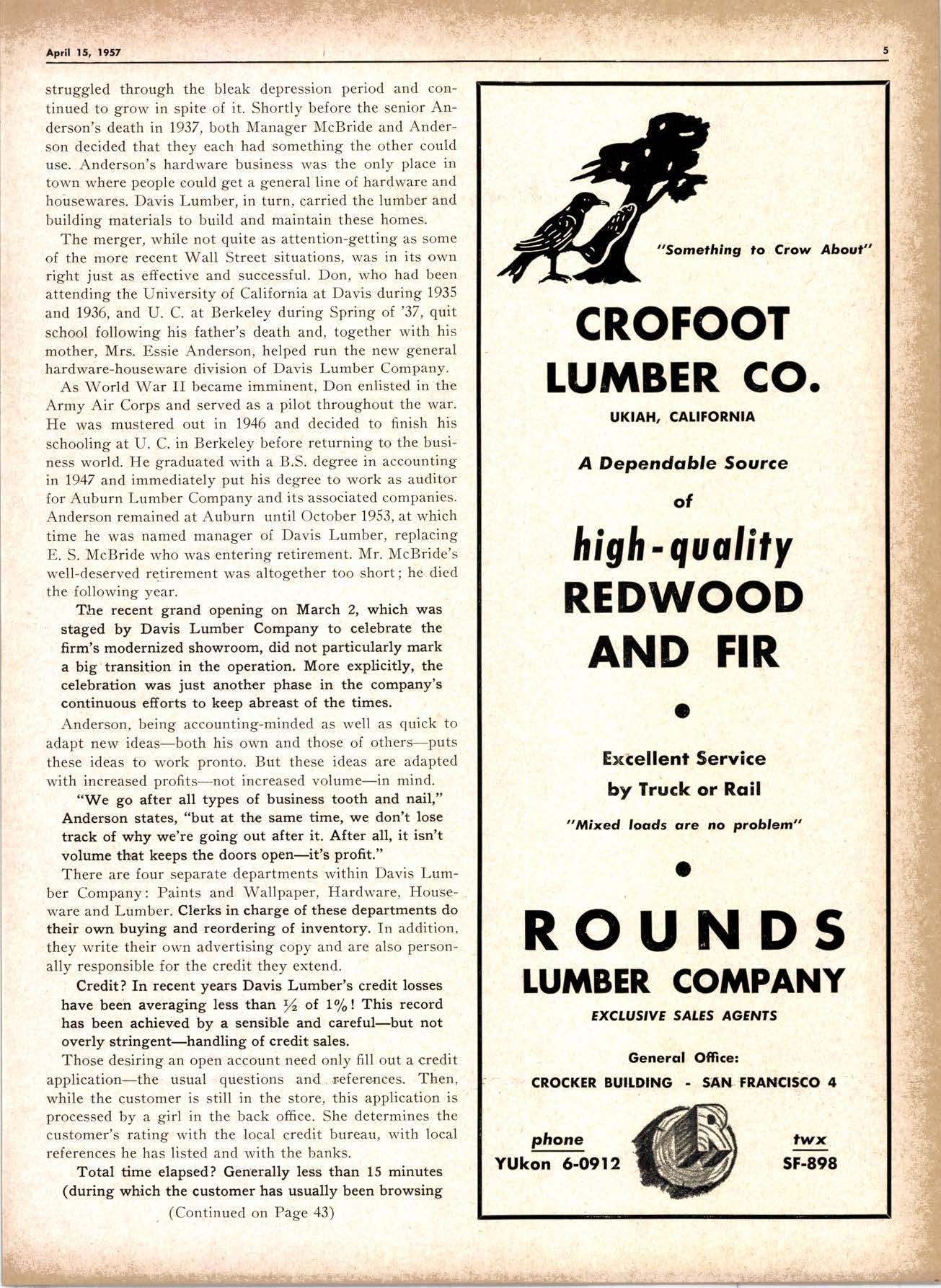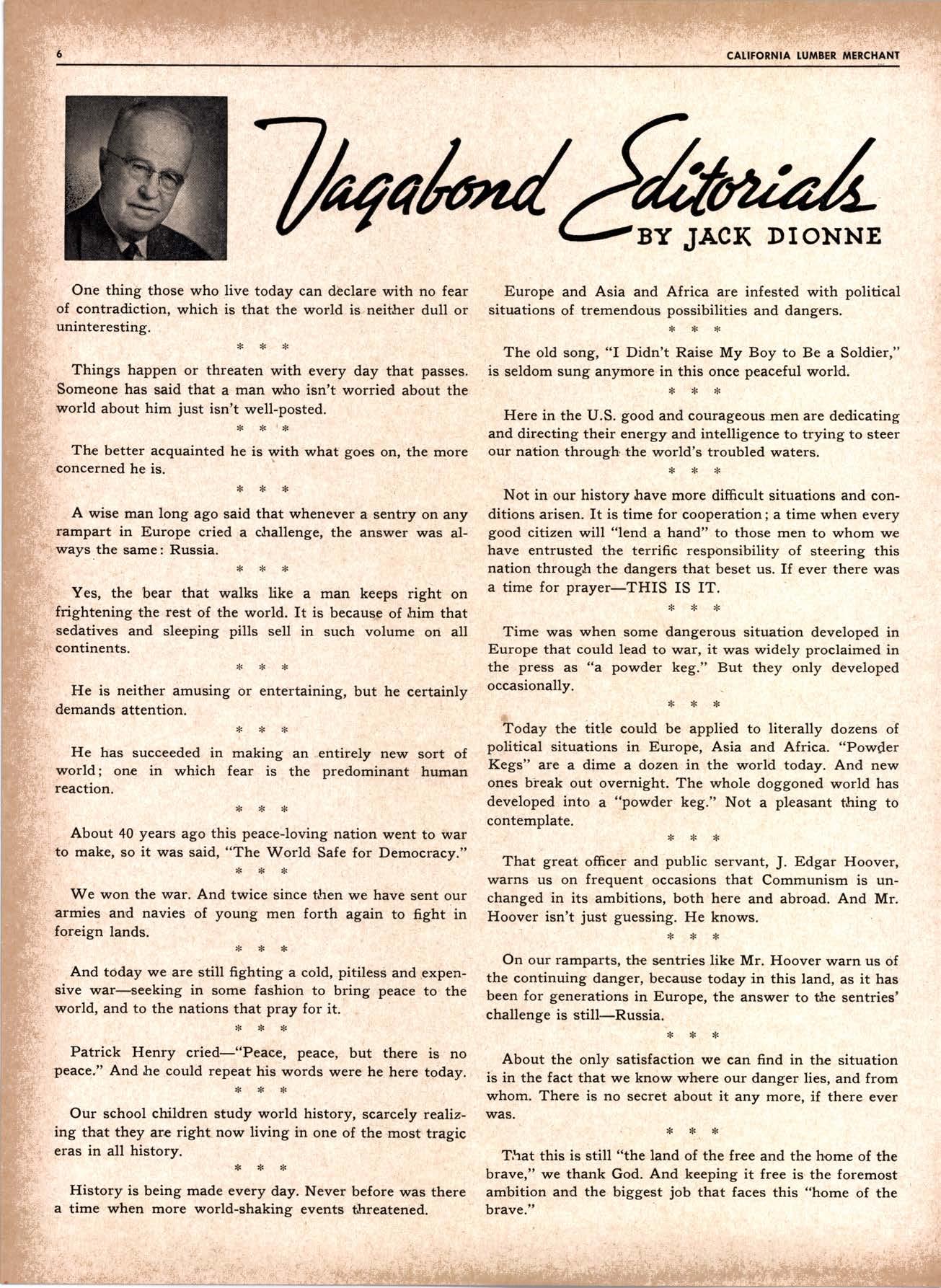
7 minute read
Blueprint for rhe Fufure's Merchclndising, Displdy, Mqnogemeht, Collecfions Drqwn by Dqvis Yqrd
The place is Davis, California, a rather small but bustling community; its principal industry, agriculture and education (University of California-School of Agriculture). The man in the limelight is Don Anderson-an affable, energetic and intelligent young man busily readying his neu'ly remodeled shorvroom for the big March 2 grand opening. Anderson is going about his preparations with the confidence of an "old pro"-and he is, in a sense, thanks to a thorough education in business management both at the University of California and the Universal School of Hard Knocks.
The business is Davis Lumber Company-a branch of Auburn Lumber Company (CLM, L2/L/56)-a company with a tap root extending sorne 75 vears down through the soil of the community.
Take these three factors-Davis, Don Anderson and l)avis Lumber Company-and you've got one of the best combinations since tl-re first wiener was introduced to the bun. And, as a matter of fact, long before the hot dog r,vas invented, say shortly'after I'resident Garfield died in office, the original owner of this yard rvas doing business in this very same spot !
Davis Lumber Company's predecessor, Morrisson Lnmber Company, was started sometin.re in the early 1880's by W. H. l\{orrisson. Efforts to peg the exact starting date have been unsuccessful but, on an old fire map which Don Anderson found back in a corner of Davis Lumber's massive old safe, Morrisson Lumber Company shorved up as one of the community's leading businesses and was locatecl at the same spot no\\, occupied by Davis Lumber Company. The map in cluestion is dated 1891, and it is apparent that Morrisson Lumber had beer-r there for some time even then. It is also interesting to note that Davis was then knor,vn as
Co. "Davisr.ille" and that the nou' "dry" college community then sported no less than l1 saloons!
A fet'years before Auburn Lumber Company purchased the assets of Nlorrisson I-umber Company-onFebruary 24, 1922-Don Anderson's father, A. G. Anderson, lvas developing a harcln'are business on the main street a block a'rvay from the lumber company. It rvas in this business that Don Anderson first learned the elements of merchandising, selling. bookkeeping and business management.
Follou,ing Auburn Lumber's purchase of Nforrrsson Lumber Company, the name of the business was changed to Davis Lumber Company and E,. S. McBride rvas installed as manager. Both Da'rris I-umber and Mr. Anderson's hardu'are business boomed along during the post-rvar days; they both
ATTRACIIVE STORE LOCATION (rop lefr) is qf corner of 3rd ond G streets in heqrl of downtown Dovis business district. Altogether. Dovis Lumber covers dn dcre of ground {fop center) ond hos undercover fqciliries of over l8,OO0 sq. ft.; rhis building houses the lumber dept. ond conlrdctor sqles office-nofe the drive-through wqrehouse which ollows eosy pickups. Across sireet from lumber dept. ond showroom is Dovis's building moteriols division. Yord Monoger Fronk Winion (lower left) shows one of Davis lumber's do-it-yourself shelving gimmicks. this one mode of 14 bricks ond two precut bocrds using redwood shorts ( net proftts of this qnd bookcoses, coffee tobles, eic., runs over I 00"/"!), lorry Brownell, hqrdwqre sfore mdnoger (lower right) struggled through the bleak depression period and continued to grow in spite of it. Shortly before the senior Anderson's death in 1937, both Manager McBride and Anderson decided that they each had something the other could use. Anderson's hardware business was the only place in town where people could get a general line of hardware and hoirsewares. Davis Lumber, in turn, carried the lumber and building materials to build and maintain these homes.
The merger, while not quite as attention-getting as some of the more recent Wall Street situations, was in its own right just as effective and successful. Don, who had been attending the University of California at Davis during 1935 and 1936, and U. C. at Berkeley during Spring of '37, quit school following his father's death and, together with his mother, Mrs. Essie Anderson, helped run the new general hardware-houseware division of Davis Lumber Company.
As World War II became imminent, Don enlisted in the Army Air Corps and served as a pilot throughout the war. He was mustered out in 1946 and decided to finish his schooling at U. C. in Berkeley before returning to the business world. He graduated with a B.S. degree in accounting in 1947 and immediately put his degree to work as auditor for Auburn Lumber Company and its associated companies. Anderson remained at Auburn until October 1953, at which time he was named manager of Davis Lumber, replacing E. S. McBride who was entering retirement. Mr. McBride's well-deserved retirement was altogether too short; he died the following year.
The recent grand opening on March 2, which was staged by Davis Lumber Company to celebrate the firmrs modernized showroom, did not particularly mark a big transition in the operation. More explicitly, the celebration was just anoth€r phase in the company's continuous efforts to keep abreast of the times.
Anderson, being accounting-minded as well as quick to adapt new ideas-both his own and those of others-puts these ideas to work pronto. But these ideas are adapted with increased profits-not increased volume-in mind.
"We go after all types of business tooth and nail," Anderson states, "but at the same time, we don't lose track of why we're going out after it. After all, it isn't volume that keeps the doors open-it's profit."
There are four separate departments within Davis Lumber Company: Paints and Wallpaper, Hardware, Houseware and Lumber. Clerks in charge of these departments do their own buying and reordering of inventory. In addition, they write their own advertising copy and are also personally responsible for the credit they extend.

Credit? fn recent years Davis Lumber's credit losses have beeh averaging less than I of. lo/o! This record has been achieved by a sensible and careful-but not overly stringent-handling of credit sales.
Those desiring. an open account need only fill out a credit application-the usual questions and ,.neferences. Then, while the customer is still in the store, this application is processed by a girl in the back office. She determines the customer's rating with the local credit bureau, with local references he has listed and with the banks.
Total time elapsed? Generally less than 15 minutes (during wh.ich the customer has usually been browsing on Page 43)
'One thing those who live today can dbclarc with no fear of contradiction, which is that the world is..neither dull or uninteresting.
I , Things happen or threaten with every day that passes. ;rSomeone has said that a man who isn't worried about the ;:lporld about him just isn't well-posted.
The better acquainted he is with what goes on, the more l.boncerned he is;
!F:F* tr t rl.
, A wise man long ago said that whenever a sentry on any l;lr.rarnpart in Errrope cried,a challenge, the answer was althe same: Russia.
Yes, the bear that walks like a man keeps right on ftightening the rest of the world. It is becausp of him that "sedatives and sleeping pills sell in such volume ori all continents.
;' ' He is neither amusing or entertaining, but he certainly :i demands attention.
: He has succeeded in rnaking an -entire,ly new sort of world; onc in which fear is the predominarrt hunan reaction,
1': * * * r- About ,10 years ago this peace-loving nation w€nt to War ;rto make, so it was said, "The World Safe for Democracy." rt*{<
We won the war. And twice since then we have sent our r brmies and navies of young men forth again to fight in t-Jqreign lands. ,1.'*** i,' And tdday we ar€ still fighting a cold, pitilesi and Bxpensive war+eeking in sorae faShioh to bring peace to the world, and to the nations that pr4y for it, ***
Patrick Henry cried-"Peaee, peace, but thcre is no i;l peace." And he could repeat his words were he [rerc today.
Our school children study world history, scarcely realizing tha.t they arc right now living ih one of the.most,tragic eras in all history.
History is being made every day. Never before was there a time when more world-shaking events t*rreatened.
BY JACK DIONNE
Europe and Asia and Africa are infested with political situations of tremendous possibilities and dangers.
The old song, "l oidrr't*n;*;, Boy to Be a Soldier," is seldom sung anymore in this once peac€ful world. {< * rNr
Here in the U.S. good and courageous-rnen are dedicating and directing their energy and intelligence to trying to steer our nation through'the world's troubled waters.
Not in our history have more difficult situations and conditions arisen. It is time for cooperation; a time when every good citizen will "lend a hand" to those men to whom we have entrusted the terrific responsibility of steering this nation through the dangers that beset us. If ever there was a time for prayer-THls IS IT.
Time was when some dangerous situation developed in Europe that could lead to war, it was widely proclaimed in the press as "a powder keg." But they only developed occasionally rt*
Today the title could be applied to literally dozens of political situations in Europe, Asia and Africa. "Powder Kegs" are a dime a dozen in the world today. And new ones bieak out overnight. The whole doggoned world has developed into a 'lpowder keg." Not a pleasant t&ring to contemplate.
That great oSce,r and public servant, J. Edgar floover, warns us on frequent, occasions that Communism is unchanged in its ambitions, both here and abroad. And Mr. Hoover isn't just guessing. He knows. ***

On our ramparts, the sentries like Mr. Hoover warn us of the continuing danger, because today in this land, as it has been for generations in Europe, the answer to the sentries' challenge is still-Russia. ***
About the only satisfaction we can find in the situation ib in the fact that we kndw wlrere our danger lies, and from whom. There is no secret about it any more, if there ever was.
That this is still "the land of the free and the home of the brave," we thank God. And keeping it free is the foremost ambition and the biggest job that faces this "home of the brave."










